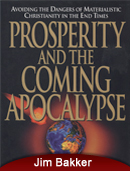The Origin of the Pretrib View
When I dug into the matter further, I was surprised to discover that many of the ideas associated with the pretributional Rapture originated not in the Bible, but in an extrabiblical vision experienced by a young Scottish woman named Margaret Macdonald in 1830. The woman sent handwritten copies of her “revelation” to Edward Irving, a controversial minister, who, with his great gifts of oratory and his magnetic personality, was drawing large crowds to his church in London. In his pamphlet, “Why I Believe the Church Will Pass Through the Tribulation,” David MacPherson described what happened after Irving got hold of Margaret Macdonald’s vision.
It was from this supposed revelation that the modern doctrine and modern phraseology respecting the pretribulational rapture arose; it came not from Scripture, but from that which falsely pretended to be the Spirit of God. Irving accepted this teaching and it was taught at prophetic meetings at Powerscourt House in Ireland, attended by Plymouth Brethren organizer John Darby. Irving’s views influenced Darby, C. H. Mackintosh, and C. I. Scofield, whose Bible popularized the new theory. Later, some of the leading Plymouth Brethren scholars, including Benjamin Newton and S. P. Tregelles, rejected this pretrib theory. For 1,800 years the Church had believed only in a postrib coming which, during persecution, was occasionally thought to be imminent. There is not a shred of historical evidence before 1830 that the Church ever believed in a double coming, or rapture before the Tribulation.
David Mac Pherson goes on to list some of the elements of Margaret’s radical vision, which included splitting the second coming of Christ into two phases – first, a pretrib rapture; then later, after the tribulation, the return of Christ to earth. Her own statement clearly contains more of the major tenets found today in pretrib dispensationalism – meeting the Lord in the air, secrecy, suddenness, invisibility, immanency, a pretrib separation of believers and unbelievers, distinction between the raptured bride and the tribulation elect.
How, you may wonder, could a vision experienced by a relatively unknown young woman with no platform or sphere of influence have such an impact? Actually, most people of her time did not know the vision was Margaret Macdonald’s. They thought the new truth was something Edward Irving had discovered in the Bible. Keep in mind that Irving was a popular preacher in those days, and his views were quickly adopted. In The Rapture Plot, David MacPherson lists four reasons why he believes the young woman was not “credited” with her vision at first: “She was a female in the male-dominated theological world of 1830; she was young; she was uneducated; and she had been a Christian only a year.” Interestingly, many of the tenets in the teachings of highly respected prophetic teachers, and other advocates of a pretribulational Rapture, are similar to those first espoused by Margaret Macdonald.
(To Be Continued)
Will We Go Through the Tribulation? – Part 1
Will We Go Through the Tribulation? – Part 2
Will We Go Through the Tribulation? – Part 3
Will We Go Through the Tribulation? – Part 4
Will We Go Through the Tribulation? – Part 5
Will We Go Through the Tribulation? – Part 7
Will We Go Through the Tribulation? – Part 8
Will We Go Through the Tribulation? – Part 9
Will We Go Through the Tribulation? – Part 10
Will We Go Through the Tribulation? – Part 11
Excerpt from Prosperity and the Coming Apocalypse

Published in 1998




Exactly! This became a doctrine in the church long before that womans vision. We would not base our belief on only that. There two second comings in the bible. They are very different! Thank you for your comment. Ruth
Wycliffe and Tyndale, one used the word “CHURCH” only where it spoke of a pagan temple, the other used “CHURCHES” where it spoke of pagan temples. “Assembly” is the right word to use.
Anyone who believes in Yahweh Messiah will suffer persecution and tribulation. People that believe in Yahweh and the Messiah will go through the wrath of Satan, but Yahweh will save His people from His Wrath when He pours it out on this earth and kills and burns every person that is left. All people alive at that time will go through the Tribulation Period.
I’m glad that this was here Paul said that we would have trials and tribulations, and we all feel it. Times are rough and I agree, but thanks to what Christ leads us to do, we get to see and have that hope from His word. We’re not all here for the same work, but Christ had you write this website and His promise gives us His hope. We believe because Christ is in you, in me, in all of us. Thanks. Let’s both thank Christ in person in this near coming future event.